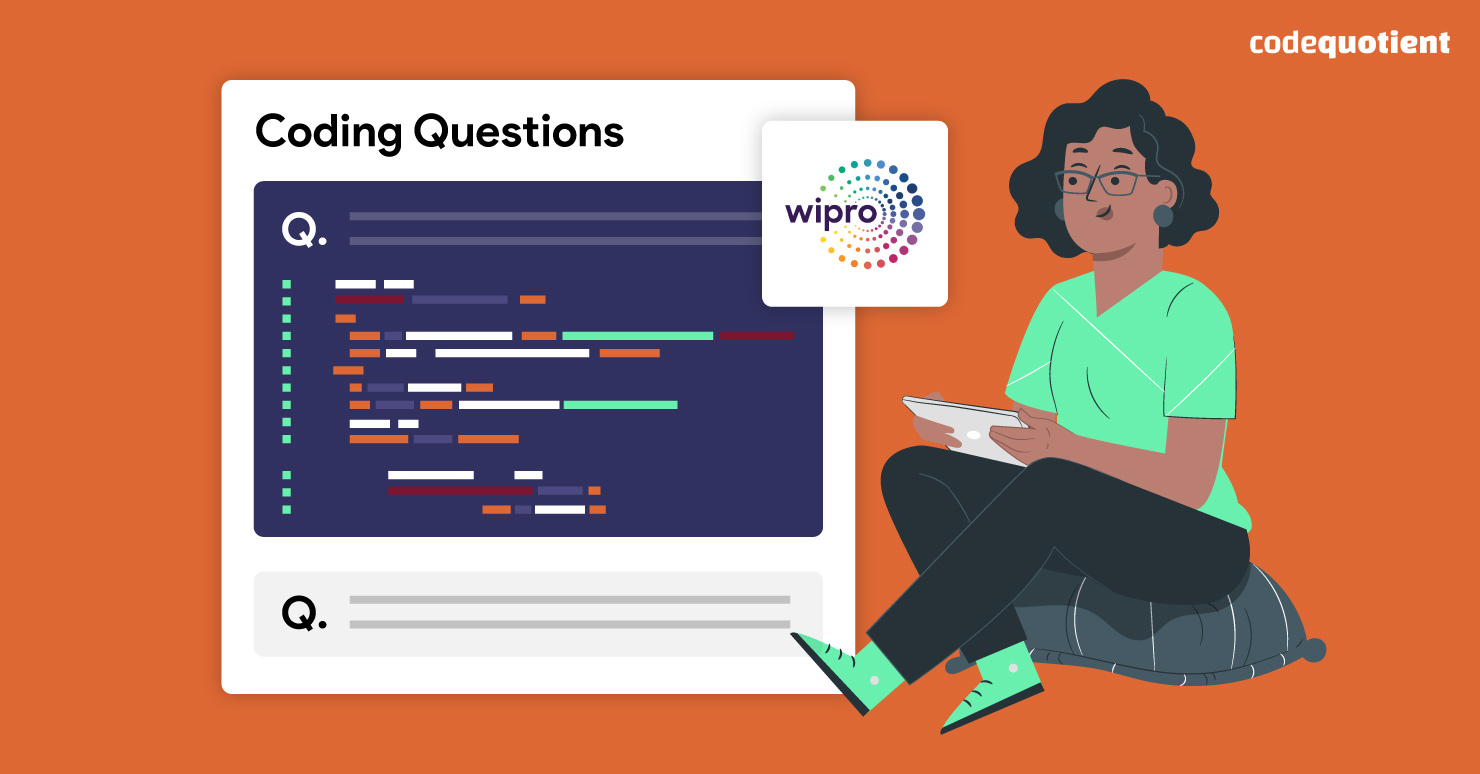Do you have an upcoming interview with WIPRO and want to know about some of the questions that are commonly asked of freshers? Are you not able to find good coding questions on the internet? Here is a comprehensive list of Wipro Coding Questions that most interviews ask.
Wipro is one of the globally renowned Indian tech giants in the Digital, Technology, and Business Solutions domains. With its Indian headquarters in Bengaluru, Wipro is one of the most sought-after employers, with 220,000 employees serving clients across six continents.
Wipro offers an average salary of ₹3,82,822 per year for coding freshers. Entry-level programming jobs at Wipro offer a high scope for learning and growth. Nonetheless, if you are a software job aspirant aiming to crack the interview in this tech giant, Wipro coding questions are the place to start your interview prep.
Wipro Coding Questions to Ease Your Interview Prep

Wipro coding questions 1:
Write a program to implement a bubble sort algorithm for sorting the elements of an array. ( Source
Code in C:
#include <stdio.h>
void bubbleSort(int arr[], int n)
{
int i, j, temp;
for(i = 0; i < n; i++)
{
for(j = 0; j < n-i-1; j++)
{
if( arr[j] > arr[j+1])
{
temp = arr[j];
arr[j] = arr[j+1];
arr[j+1] = temp;
}
int main()
{
int arr[100], i, n, step, temp;
scanf(“%d”, &n);
for(i = 0; i < n; i++)
{
scanf(“%d”, &arr[i]);
}
bubbleSort(arr, n);
for(i = 0; i < n; i++)
{
printf(“%d “, arr[i]);
}
return 0;
}
Code in C++:
#include<iostream>
using namespace std;
void swap(int *i, int *j)
{
int temp = *i;
*i = *j;
*j = temp;
}
int seperateEvenAndOdd(int arr[], int size)
{
int left = 0;
int right = size – 1;
while(left < right)
{
while(arr[left]%2 == 0 && left < right)
{
left++;
}
while(arr[right]%2 == 1 && left < right)
{
right–;
}
if(left < right)
{
swap(&arr[left], &arr[right]);
left++;
right–;
}
int main()
{
int arr_size;
cin >> arr_size;
int arr[arr_size];
for(int i=0;i<arr_size;i++)
{
cin >> arr[i];
}
int i=0;
seperateEvenAndOdd(arr,arr_size);
for(i=0;i<arr_size;i++)
cout << arr[i] << ” “;
return 0;
}
Input:
6
34 9 13 81 64 2
Output:
2 9 13 34 64 81
Wipro coding questions #2
Write a C program to convert a decimal number to binary and print the count of 1’s in it. If 1’s are not present in the binary number, print invalid input.
Code in C: (Source)
/*
* C program to accept a decimal number and convert it to binary
* and count the number of 1’s in the binary number
*/
#include <stdio.h>
void main()
{
long num, decimal_num, remainder, base = 1, binary = 0, no_of_1s = 0;
printf(“Enter a decimal integer \n”);
scanf(“%ld”, &num);
decimal_num = num;
while (num > 0)
{
remainder = num % 2;
/* To count no.of 1s */
if (remainder == 1)
{
no_of_1s++;
}
binary = binary + remainder * base;
num = num / 2;
base = base * 10;
}
printf(“Input number is = %d\n”, decimal_num);
printf(“Its binary equivalent is = %ld\n”, binary);
printf(“No.of 1’s in the binary number is = %d\n”, no_of_1s);
}
Output:
$ cc pgm46.c
$ a.out
Enter a decimal integer
134
Input number is = 134
Its binary equivalent is = 10000110
No.of 1’s in the binary number is = 3
Wipro coding question #3:
Given a binary number as input, we need to write a program to convert the given binary number into an equivalent decimal number.
Code in C++: (Source)
// C++ program to convert binary to decimal
#include <iostream>
using namespace std;
// Function to convert binary to decimal
int binaryToDecimal(int n)
{
int num = n;
int dec_value = 0;
// Initializing base value to 1, i.e 2^0
int base = 1;
int temp = num;
while (temp) {
int last_digit = temp % 10;
temp = temp / 10;
dec_value += last_digit * base;
base = base * 2;
}
return dec_value;
}
// Driver program to test above function
int main()
{
int num = 10101001;
cout << binaryToDecimal(num) << endl;
}
Code in Java:
// Java program to convert
// binary to decimal
// Function to convert
// binary to decimal
class GFG {
static int binaryToDecimal(int n)
{
int num = n;
int dec_value = 0;
// Initializing base
// value to 1, i.e 2^0
int base = 1;
int temp = num;
while (temp > 0) {
int last_digit = temp % 10;
temp = temp / 10;
dec_value += last_digit * base;
base = base * 2;
}
return dec_value;
}
// Driver Code
public static void main(String[] args)
{
int num = 10101001;
System.out.println(binaryToDecimal(num));
}
//
Output:
169
Wipro coding question #4:
Write a program to find the factorial of a number using a loop.
Code in C: (Source)
#include <stdio.h>
int main() {
int n, i;
unsigned long long fact = 1;
printf(“Enter an integer: “);
scanf(“%d”, &n);
if (n < 0)
printf(“Error! Factorial of a negative number doesn’t exist.”);
else {
for (i = 1; i <= n; ++i)
{
fact *= i;
}
printf(“Factorial of %d = %llu”, n, fact);
}
return 0;
}
Input:
Enter an integer: 5
Factorial of 5 = 120
Code in C++ (Source)
#include <iostream>
using namespace std;
int main() {
int n;
long double factorial = 1.0;
cout << “Enter a positive integer: “;
cin >> n;
if (n < 0)
cout << “Error! Factorial of a negative number doesn’t exist.”;
else {
for(int i = 1; i <= n; ++i) {
factorial *= i;
}
cout << “Factorial of ” << n << ” = ” << factorial;
}
return 0;
}
Output
Enter a positive integer: 12
Factorial of 12 = 479001600
Wipro Coding Question #5:
How to Remove Duplicates from Array Without Using Java Collection API?
Code in Java:
Import java.util.Arrays;
Now, import org.slf4j.Logger;
import org.slf4j.LoggerFactory;
/**
“Java program to remove duplicates from this array. You don’t
need to physically delete duplicate elements, replacing with null, or
empty or default value is ok.
*
/
public class TechnicalInterviewTest {
private static final Logger logger = LoggerFactory.getLogger(TechnicalInterviewTest.class);
public static void main(String args[]) {
int[][] test = new int[][]{
={1, 1, 2, 2, 3, 4, 5},
{1, 1, 1, 1, 1, 1, 1},
={1, 2, 3, 4, 5, 6, 7},
{1, 2, 1, 1, 1, 1, 1},};
for (int[] input : test) {
System.out.println(“Array with Duplicates : ” + Arrays.toString(input));
System.out.println(“After removing duplicates : ” + Arrays.toString(removeDuplicates(input)));
}
“/
Method to remove duplicates from array in Java, without using
Collection classes e.g. Set or ArrayList. Algorithm for this
method is simple, it first sort the array and then compare adjacent
objects, leaving out duplicates, which is already in the result.
/”
public static int[] removeDuplicates(int[] numbersWithDuplicates) {
// Sorting array to bring duplicates together
Arrays.sort(numbersWithDuplicates);
int[] result = new int[numbersWithDuplicates.length];
int previous = numbersWithDuplicates[0];
result[0] = previous;
for (int i = 1; i < numbersWithDuplicates.length; i++) {
int ch = numbersWithDuplicates[i];
if (previous != ch) {
result[i] = ch;
}
previous = ch;
}
return result;
}
Output:
Array with Duplicates : [1, 1, 2, 2, 3, 4, 5]
After removing duplicates : [1, 0, 2, 0, 3, 4, 5]
Array with Duplicates : [1, 1, 1, 1, 1, 1, 1]
After removing duplicates : [1, 0, 0, 0, 0, 0, 0]
Array with Duplicates : [1, 2, 3, 4, 5, 6, 7]
After removing duplicates : [1, 2, 3, 4, 5, 6, 7]
Array with Duplicates : [1, 2, 1, 1, 1, 1, 1]
After removing duplicates : [1, 0, 0, 0, 0, 0, 2]
Wipro Coding Question #6:
Write a program in Java to reverse a number. ( Source
Code in Java:
public class Solution {
public static long reverseNumber(long n) {
// Remove all trailing zeros
while (n % 10 == 0) {
n = n / 10;
}
// Declare reverseNum and remainder and initialize them with 0
long reverseNum = 0;
long reminder = 0;
while (n > 0) {
reminder = (int) (n % 10);
reverseNum = reverseNum * 10 + reminder;
n = n / 10;
}
// Return the reverse number
return reverseNum;
}
Input:
3456
Output:
6543
Become a SuperCoder with CodeQuotient
However, the Wipro coding questions we have provided here are for a basic understanding. Coding questions in interviews can vary in complexity and experience level. To ace a coding interview of any complexity level, you will need training from experts.
CodeQuotient’s trainers in our Software Engineering Bootcamp are experts in simplifying coding and helping you crack interviews confidently. Get in touch with our team to know how our dedicated software training internships help you kickstart your software career.




